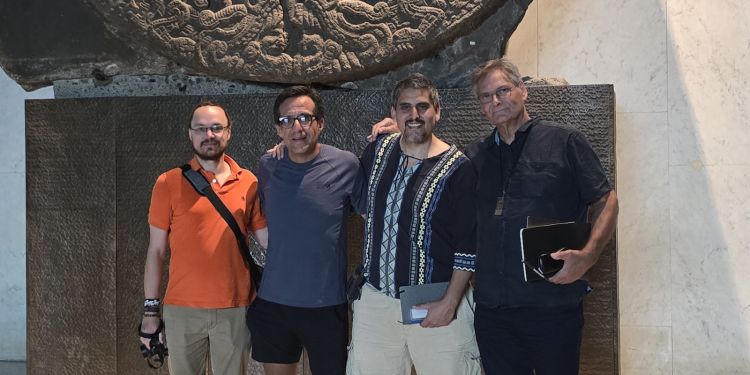International collaboration explores sacred socio-ecological systems

A new interdisciplinary collaboration is taking shape between the School of Geography and the Universidad Nacional Autónoma de México (UNAM).
Professor Jon Lovett visited Mexico City in July this year to work with a group that brings together history, ecology, astronomy, mathematics, nutrition, climate change, tipping points and sustainability.
The team are calling their research topic the ‘Ecology of the Sacred.’ They have been commissioned by the science publisher Palgrave to write a Pivot monograph on the topic.
They were meeting in the Mexican Museo Nacional de Antropologia, home of the famous Aztec Sun Stone, to finalise the text.
Ecology of the Sacred
Professor Lovett explains: “The ecology of the sacred refers to the deep ways in which communities relate to nature through rituals, symbols, and shared practices.
“These include dance, food, architecture, and calendars, forms of knowledge that may not appear scientific at first glance but have guided ecological care and decision-making for generations.”
The group is using the emerging theory of anti-fragility as the basis for their research.
The theory proposes that socio-ecological systems can have positive responses to stress and shock that strengthen rather than weaken them.
The team’s central hypothesis is that societies capable of intergenerational adaptation and survival rely on an integration of knowledge systems, both scientific and sacred.

Dr Oliver López-Corona, a physicist working with the Instituto de Investigaciones en Matemáticas Aplicadas y en Sistemas at UNAM, says: “Far from being relics of the past, sacred traditions carry the wisdom of how to live with the land, recognizing ecological time cycles, and maintaining balance in the face of change.”
The group considers that this novel framework responds to an urgent need: in the face of ecological tipping points, there is growing recognition that sustainable futures require not only scientific knowledge but also the reintegration of traditional, culturally rooted frameworks that maintain ecosystems within boundaries of antifragility.
More information
Top image: Left to right, historian Dr Gabriel Kruell, astronomer Professor Sergio Mendoza, physicist Dr Oliver López-Corona from UNAM and ecologist Professor Jon Lovett by the Sun Stone in the Museo Nacional de Antropologia.




